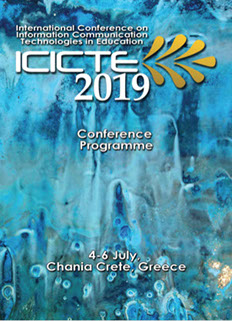
Thursday –July 4 Friday – July 5 Saturday – July 6
Thursday – July 4
09:00 – 10:00
Registration
Athina Lobby
10:00 – 11:30
Opening Ceremonies and Keynote Address
Hall Athina
Welcome and Introduction of the Keynote Speaker: Dr Ġorġ Mallia, Chair of the Communications Committee and Communications Coordinator & Head of the Media and Communications Department, Faculty of Media and Knowledge Sciences, University of Malta, MALTA
Keynote Address:
Connected Learning and Social Justice Education in Neoliberal Times: Challenges and Possibilities
Professor John-Peter Portelli
Professor in the Department of Social Justice Education and co-director of the Centre for Leadership and Diversity, OISE, University of Toronto, Canada.
We are living in the midst of a robust neoliberal context that privileges excessive individualism and competition, narrow views of accountability, standardization, and democracy defined as a dangerous form of license that privileges those that traditionally have been privileged. Building on research in Canada and Malta, this presentation will identify the challenges that educators who promote and actualize Connected Learning from a Social Justice Education perspective face. It will be argued that neoliberalism is the new form of colonialism. The presentation will also make suggestions about how to deal with these challenges on the basis of “the ethics of subversion.”
11:30 – 12:00
Coffee
Athina Lobby
12:00 – 13:30
Concurrent Sessions 1-2
Plenary Session 1: Rethinking the Practice of Teaching
Hall Athina
Moderator: Dr Chris Barlow, Solent University, United Kingdom of America
ICT IN TEACHER EDUCATION: EDUCAMPS AND PEER LEARNING
Sólveig Jakobsdóttir, University of Iceland, Iceland
Educamp is an event where participants share possibilities of software tools and network with each other. This method has been used at the University of Iceland from 2014 to the present in a course on Information Communication Technologies (ICT) for undergraduate teacher students who are earning a B.Ed. degree. They submitted reflections about their contributions and experiences. Most rated the educamp as interesting/fun and felt they had learned much. Participants enjoy and learn from the educamp method to reflect and think about using ICT in education. The method can be recommended as a way to increase ICT competences of teacher students.
PEDAGOGICAL SIMULATION AS A TOOL FOR PROFESSIONAL DEVELOPMENT AMONG INTERNS IN TEACHING
Zuhaira Najjar, Wafa Zidan, & Roseland Da’eem, The Arab Academic College For Education In Israel-Haifa, Israel
This study was carried out in a mixed approach of qualitative and quantitative methodology in order to examine the satisfaction of intern-teachers with a simulation-based learning method. It presents participants’ perceptions regarding a simulation workshop’s contribution to the professional development of beginning teachers. Findings indicate remarkable satisfaction of the participants with the simulation-based learning method. They perceive the simulation as an effective learning method that contributes to acquiring communication skills and assists in conflict resolution and analysis of classroom scenarios. It contributes to their professional development and, therefore, they suggested an increase in their participation in the simulation workshops during their internship process.
IN SEARCH OF ONLINE LEARNING 3.0 IN HIGHER EDUCATION—THE ROLE OF THEORY-BASED PROCESS EVALUATION
Monica Liljeström, Hanna Paulin, & Carina Holmgren, Umeå University, Sweden
In this paper, a model for theory-based process evaluation in online learning is suggested and discussed in relation to its potential as a tool to reveal strengths and weaknesses in a current online module in a fully online course in Educational Science Education. The suggested focal points at this stage of the process evaluation plan are based on socio-cultural outlooks on learning and guided by theory-based process evaluation theory. The evaluation model will be tested for the first time in autumn 2019.
MULTIMODAL CARTOGRAPHIC MAPPING: ECOPEDAGOGICAL SPACES IN THE EVOLVING AUSTRALIAN TECH ENVIRONMENT
Katherine Bates, University of Technology Sydney Broadway, Australia
This paper describes the design and implementation of a project that involved embodied outdoor experiences for mapping Country using ICT. The project was undertaken by preservice teachers learning about the Geography substrand within the Humanities and Social Sciences Australian curriculum as part of the Bachelor of Education, Primary - Aboriginal and Torres Strait Islander Education Program. Results indicate that immersive learning experiences can be embedded authentically with technology to collect and present data. Findings also suggest that pre-teachers can benefit from outdoor experiences utilizing ICT to develop their understanding of symbiotic relationships between technology and immersion pedagogies in teaching practices.
Plenary Session 2: Advancing a Culture of Innovation: Online, Blended, and Virtual
Hall Ariadne
Moderator: Dr Marcie Boucouvalas, Professor Emerita, Virginia Tech, United States of America
EVALUATION OF AN E-LEARNING COURSE IN MOODLE IN COMPARISON TO A TRADITIONAL LESSON
Heidi Schuhbauer, Technische Hochschule Nürnberg Georg Simon Ohm, Germany
A Moodle course was used in an e-learning unit to compare undergraduate students’ outcomes to those in a traditional lesson. A traditional teaching unit was presented for a parallel control group. After the lessons, the students performed the same exercises. Afterwards, the learning success of the students was compared. In addition to the quiz assessment, the students were asked about their personal impressions in a questionnaire. The result of the quiz was that the group with the traditional lesson achieved results that were slightly better than those of the e-learning group. The evaluation revealed that the students’ opinions about the e-learning course differ more than the opinions about the traditional unit.
PREDICTING PERFORMANCE AND ANALYZING STUDENTS’ BEHAVIOR FROM COMPUTER-GENERATED LOG FILES IN MOODLE
Lan Umek, Damijana Keržič, Nina Tomaževič, & Aleksander Aristovnik, University of Ljubljana, Faculty of Public Administration, Slovenia
This paper presents the results of the investigation into whether the student’s behavior in the e-classroom in terms of action logs correlates with their academic performance. The empirical research was based on logs obtained from Moodle, which is used to manage blended learning at the faculty. The main finding from this research is that there is some relationship between some types of interactions and academic performance in selected online courses. The findings of the paper confirm that by monitoring Moodle activity data, lecturers can identify weak students and promptly adjust and individually support their pedagogical activities during the semester.
BLENDED LEARNING IN LSP ACADEMIC PROGRAMMES: CHALLENGES AND BENEFITS
Mohammad M. Etedali, University of Jyväskylä, Finland
Extensive use of technologies has brought many changes into different aspects of life, including teaching and learning. Teaching and learning languages are not exceptions and they have witnessed tremendous changes in the past 25 years. These changes put the need to learn languages to improve communication into spotlight. Language for Specific Purposes (LSP)—aka ESP: English for Specific Purposes—programmes strive to prepare university graduates who are linguistically and communicatively proficient and adequately accurate in their areas of expertise. This paper is an attempt to address some of these challenges in university LSP programs and offer possible solutions.
DEBATE “PRO ET CONTRA” AS AN EFFICIENT METHOD FOR BUILDING PLURAL COMMUNITIES OF TEACHERS AND PhD STUDENTS IN A MUTUAL COOPERATIVE LEARNING PROCESS
Aleksandar Kešeljević, University of Ljubljana, Slovenia
Economic theory lost the capacity of an anthropocentric view of the world due to the domination of the neoclassical paradigm and the lack of pluralism within economics and beyond it. Debate is an appropriate educational method for introducing more pluralism into the education of today’s PhD students in order to foster their understanding of today’s emerging problems. This paper presents debate “pro et contra” as a highly structured rhetorical event and disciplined conversation about topics of interest with opposing advocates alternating before a decision-making body. The qualitative analysis shows that debate, including virtual debate, increases students’ capacity for critical, controversial and original thinking and that is a highly efficient method for promoting a more cooperative learning process. In this way, knowledge is necessarily dispersed and not given completely to anyone since it is embedded not only in a traditional one-way transfer of knowledge from teachers to students but also in debates, teamwork and class conversations.
13:30 – 15:00
Workshops
Hall Athina
DESIGN A LEARNING ADVENTURE
Facilitator: Henrik Krantz, Johan Borvén and Fredrik Åkerlind, Göteborgsregionen, Sweden
Hall Ariadne
COLLABORATIVE ONLINE INTERNATIONAL LEARNING (COIL)—INTERNATIONALIZING UNIVERSITY CURRICULUM
Facilitators: Dr. Purba Das & Dr. Sheida Shirvani, Ohio University, U.S.A.
15:00 – 17:00
Lunch
Thalassa Restaurant
20:00
Welcome Reception
Thalassa Restaurant
Friday – July, 5
09:00 – 10:00
Poster Session
Hall Athina
Adjudicating Panel:
Dr Marcie Boucouvalas, Professor Emerita, Virginia Tech, United States of America
Dr Ġorġ Mallia, University of Malta, Malta
Dr Linda Morris, Northwestern State University, Natchitoches, Louisiana, United States of America
Dr Zuhaira Najjar, The Arab Academic College for Education in Israel-Haifa, Israel
Dr Costas Tsolakidis, Professor Emeritus, University of the Aegean, Greece
INTERVENTION WITH AHA SYSTEM TO IMPROVE SPELLING AND READING SKILLS FOR STUDENTS DIAGNOSED WITH ASD
Eleni Mangina, School of Computer Science, University College Dublin, Ireland; Giuseppe Chiazzese, Consiglio Nazionale delle Ricerche, Istituto per le Technologie Didattiche, Italy; Rita Treacy, WordsWorth Learning LTD, Ireland, & Anastasia Pyrini, School of Computer Science, University College Dublin, Ireland
ENHANCING SPATIAL PERCEPTION OF VIRTUAL OBJECTS THROUGH MID-AIR FEEDBACK FOR USERS WITH HEARING OR SIGHT IMPAIRMENT
Tychonas Michailidis, Chris Barlow, & Jaz Marshall-Porter, Solent University, Southampton, United Kingdom
BASE: BEHAVIOURAL ASSESSMENT TO IMPROVE SCHOOL ENVIRONMENT PROJECT
Giuseppe Chiazzese, Consiglio Nazionale delle Ricerche - Istituto per le Tecnologie Didattiche, Italy; Eleni Mangina, School of Computer Science, University College Dublin, Ireland; Sui Lin Goei, Stichting Vrije Universiteit Amsterdam, Netherlands; Gianluca Merlo, Anastasia Pyrini, Consiglio Nazionale delle Ricerche - Istituto per le Tecnologie Didattiche, Italy; Anca Menina Danci, Fundatia de Abilitare Speranta, Romania
INTEGRATING MOBILE AND BLENDED LEARNING IN UNIVERSITY TEACHING: TEACHERS’ TALK ABOUT STUDENTS’ PERCEPTIONS
Marcia Håkansson Lindqvist, Department of Education, Mid Sweden University, Sundsvall, Sweden
COMBINING VIRTUAL REALITY AND ACOUSTIC MODELLING TO CREATE AN IMMERSIVE EXPERIENCE OF ANCIENT BUILDINGS: THE ODEON HERODES ATTICUS, GREECE
Christopher Barlow and Eleni Tavelidou, Solent University, Southampton, UK
BLENDED LEARNING—A WHOLE FACULTY APPROACH
Karin Thiele Watson, University UNSW Sydney, Australia
10:00 - 11:30
Keynote Address
Hall Athina
THE BLOCKCHAIN AND EDUCATION: EXPLORING OPPORTUNITIES AND DEBUNKING MYTHS
Dr Alex Grech, Director, Commonwealth Centre for Connected Learning, Valletta, MALTA
In 2019, the Blockchain continues to be associated with cryptography and the fintech industry, with seemingly modest inroads into the education sector, with the exception of the research community. Yet in some parts of the world, blockchain is becoming synonymous with decentralised consensus solutions to long-standing challenges for both education institutions and students. The keynote will provide a quick introduction to the blockchain and explore how the affordances of the technology provide an opportunity to re-think qualifications, credentials, identity, trust and self-sovereignty in the education value chain. It will lever on ongoing studies for the European Commission and first-hand experiences in setting up the first nation-state pilot aiming to notarise all citizens’ education credentials on the blockchain. The presentation will conclude with ideas on what the future may hold as the blockchain becomes less of a novelty technology and more embedded in everyday life.
11:30 – 12:00
Coffee
Athina Lobby
12:00 – 13:30
Concurrent Sessions 3-4
Plenary Session 3: Measuring Undergraduate Learning: Implementation and Impact
Hall Athina
Moderator: Moderator: Dr Ġorġ Mallia, University of Malta, Malta
THE EFFECTIVENESS OF PEER ASSESSMENT IN THE FLIPPED CLASSROOM
Wing Shui Ng & Ka Luen Cheung, The Education University of Hong Kong, Hong Kong
The flipped classroom pedagogy has been promoted to encourage students to learn at their own pace outside the classroom and with the absence of teachers. Valuable in-class time can thus be freed up for students to deepen their understanding of the content. However, learning at home can promote a lackadaisical learning environment. Student learning relies heavily on learning motivation. To address this motivational challenge, a peer assessment component was deliberately integrated into the flipped classroom pedagogy in this study. Preliminary results suggest that the students demonstrated a good attitude in the pre-lesson peer assessment process, and they were satisfied with the peer assessment activity.
THE IMPACT OF BLENDED LEARNING ON STUDENT PERFORMANCE IN AN INTENSIVE BLOCK MODE TEACHING SETTING
Fotios Sidiroglou & Neil Fernandes, Victoria University, Australia
In an attempt to transform the first-year student experience, Victoria University adopted a Block Teaching Model. Under this 3.5 weeks-long intensive setting for a physics unit, face-to-face sessions were complemented with various blended learning initiatives, including interactive HTML5 (H5P) rich video presentations, an open-access electronic textbook, and online simulations and quizzes. A strong correlation between student performance in assessment tasks and participation in corresponding blended learning activities was discovered. Similar findings were obtained by analysing gain in student conceptual understanding. These results clearly showcase how technology enabled learning can enhance student performance in an intensive block mode teaching setting.
IMPACT OF FEEDBACK IN CLINICAL EDUCATION: HIGHLIGHTS AND CHALLENGES OF THE FEEDBACK LOOP FOR HEALTH PROFESSIONAL STUDENTS
Sophia Xenos, Anna Pietrolungo, & Sonja Cleary, RMIT University, Australia
The provision of feedback to students forms an integral part of the learning process. Indeed, effective, regular, and consistent feedback has the potential to reinforce good practice and motivate the student learner towards the desired outcome. This is particularly important in a clinical learning environment, where students are developing critical skills as future health care professionals. Unfortunately, despite the important role of feedback in student learning, skills in giving and receiving feedback are rarely taught to students or clinicians. The current study describes the outcomes of the “feedback-loop” – a clinical innovation which aimed to improve the preparation of undergraduate and postgraduate health professional students with their clinical work via the introduction of effective and consistent performance feedback opportunities to students regarding various aspects of their clinical skill development. This initiative was introduced across five courses within the School of Health & Biomedical Sciences, where many of the programs are focused on the development of clinical competencies in the healthcare setting. Increases in student ratings of course satisfaction and clinical competencies were shown following implementation of the feedback-loop. Key highlights, implications, and challenges of this clinical initiative are discussed.
IMPROVING STUDENT ENGAGEMENT AND SELF-REGULATED LEARNING THROUGH TECHNOLOGY-ENHANCED STUDENT PARTNERSHIPS
Julie Crough & Christopher Love, Griffith University, Australia
Teaching and learning in higher education for the Science, Technology, Engineering and Mathematics disciplines are renowned for their challenges. This paper explores how embedding a personal learning platform (PebblePad) through a Students as Partners (SaP) initiative has resulted in a higher degree of student engagement in a second-year biochemistry course and unexpected benefits for students based on reflections about their experience. Adopting a digital platform enabled surprisingly honest, uninhibited and extensive student reflections. In addition, while the coupling of the SaP initiative with educational technology has exceeded expectations, early findings suggest that the process is also contributing positively to students’ self-regulated learning.
TEACHING TO SOLVE GLOBAL WARMING WITH DATA SCIENCE
Cédric Mesnage, Solent University, Southampton, United Kingdom
We report on the design and execution of a Data Science assignment in which students work on Global Warming issues and predict the outcome of solutions. The paper outlines how to solve Global Warming through the design of an assignment and gives elements of answers to research questions regarding research in the classroom, the benefits to students and how to influence policy makers.
Plenary Session 4: Integrating Technology in the P-9 Curriculum
Hall Ariadne
Moderator: Moderator: Evangeline Marlos Varonis, Hiram College, United States of
America
DIGITAL TECHNOLOGIES IN PRESCHOOL TEACHER WORK TEAMS’ USE OF SHARED ACTIVE SCREEN
Marcia Håkansson Lindqvist, Mid Sweden University, Sweden
This paper explores the possibilities and challenges related to the use of Shared Active Screen (SAS) from the preschool teacher work team perspective. Using learning reflections, seven work teams reflected upon the possibilities and challenges related to the use of SASs. The work teams saw challenges related to accessibility, time and professional development. Possibilities were the use of SASs in curriculum-based teaching activities and involving the children in collaborative learning activities. How preschool teacher work teams develop the use of SASs over time in their teaching activities with preschool children will be important for supporting children’s learning with digital technologies.
TECHNOLOGICAL TEACHING MATERIAL IN SCIENCE CLASSES OF GREEK ELEMENTARY SCHOOLS
Konstantinos Karampelas & Michael Skoumios, University of the Aegean, Greece
This paper aims to examine the integration of technologically oriented instructional material in elementary science in Greece. Such material is justified by research to assist science teaching. Whether teachers decide to use it depends on their knowledge and perceptions around teaching generally, the subject they teach and ICT. Based on these findings, this research study was designed aiming to show which materials teachers prefer to use in their work. This has not been thoroughly examined by research so far. Through observations and statistical analysis, the research draws conclusions about teachers’ selections and suggests ideas for further projects.
IT’S ALL ABOUT THE MIDDLE: PLACING A PEDAGOGICAL FRAMEWORK AT THE CENTER OF PRACTICE IN STEM EDUCATION
Jane Hunter, University of Technology Sydney, Australia
The Organisation for Economic Co-operation and Development (OECD) suggests that education reform initiatives in Science, Technology, Engineering and Mathematics (STEM) will require substantive changes in how these disciplines are taught at school and in teacher education institutions. In this paper I take up these challenges by examining how a longitudinal research study in six Australian primary schools supported changes to middle leaders’ classroom practices in teaching and learning. The findings demonstrate how a pedagogical framework positioned alongside professional development and working with an academic partner in a process of action research is effective for teacher professional learning in STEM.
IMPLEMENTING TABLETS IN NORWEGIAN PRIMARY SCHOOLS: EXAMINING OUTCOME MEASURES IN THE SECOND COHORT
Rune J. Krumsvik, University of Bergen, Norway; Erling Berrum, Rambøll Management, Norway; Lise Øen Jones, University of Bergen, Norway; Ingrid P. Gulbrandsen, Rambøll Management, Norway
This study examines the implementation of tablets in primary schools in Norway. The outcome measures in the study are external for the intervention and are recorded data from national tests (National reading, arithmetic and English Tests, Classes 5, 8 and 9; National Mapping Tests for reading and arithmetic, Classes 1–3; and the 2014–2017 National Pupil Survey). The entire study (N=15, 708) relies on an explanatory, sequential mixed-methods design (Fetters, Curry, & Creswell 2013), and in this study we examine the quantitative effects of this implementation. The results indicate that the impact of tablets on pupils’ school achievement varies. It seems that tablets contribute more positively to boys’ school achievements than to girls’ school achievements. However, we cannot rule out that a grade effect may also have an impact on the results, and we therefore request that the results be read with this reservation.
13:30 – 15:00
Workshops
Hall Athina
CONDUCTING PROGRAM REVIEW USING A LEARNING ANALYTICS
Facilitator: Dr. Christine Armatas, Associate Director Educational Development, The Hong Kong Polytechnic University, Hong Kong.
Hall Ariadne
AN ENGAGING CLASSROOM: ANATOMY WITH 3D PRINTED MODELS
Facilitators: Mr. Nicholas Tripodi, First Year College and Institute of Health and Sport, Victoria University, & Dr. Maja Husaric, First Year College, Victoria University, Australia
15:00 – 17:00
Lunch
Thalassa Restaurant
17:00 – 18:30
Workshop
Hall Athina
LIFELONG LEARNING AND ICT BLENDING THE MOVEMENTS
Facilitators: Dr Linda Morris, Adult Development Associates, United States of America &
Dr Marcie Boucouvalas, Professor Emerita, Virginia Tech, United States of America
Interviews
Hall Ariadne
Speak personally with Stacie Boucouvalas-Gianourakos
Share your experiences of ICICTE and your areas of expertise with Stacie, who is documenting the conference which is now in its 19th year. Your cooperation would be greatly appreciated.
Saturday – July, 6
09:00 – 10:30
Session 5 and Workshop
Plenary Session 5: Digital Skill Sets and Mind Sets
Hall Athina
Moderator: Dr Linda Morris, Adult Development Associates, United States of America
A ROBOT AS A TOOL FOR COGNITION
Derrick Kachisa & Linn Gustavsson, University West, Sweden
Various kinds of robots are available for use in education; however, their mere availability should not be enough reason to use them as a learning tool. Different types have different appearances, structures (hardware), systems (software) and functions (behavioral outcomes). These features serve an important role in determining the curricula, the instructional activities, and the learning objectives. The suitability of a robot as a learning tool depends on how it fits into a learner’s environment, the role it plays and how learners engage with it in order to achieve a learning objective. This study presents a theoretical framework, key research areas, and practical examples of how we use robots in practical learning examples both in an academic educational environment and in industry. Challenges and benefits are discussed.
DEMONSTRATING APPLICATIONS FOR LEARNING ANALYTICS FOR PROGRAM REVIEW
Christine Armatas & Christine F. Spratt, The Hong Kong Polytechnic University, Hong Kong
The Program Review Tool (PRT) has been developed to conduct program-level learning analytics. Examples of review outputs using the tool illustrate its value, showing how the PRT allows users to conduct analyses that provide insights for improving the curriculum and for supporting students during their studies. PRT analyses address questions about program progression and retention, factors influencing academic outcomes and how to improve the curriculum and subjects. With the PRT, users can conduct a standard review or explore program data themselves, making it a powerful yet flexible tool for enhancing program quality.
FOSTERING A CRITICAL APPROACH TO DIGITAL TECHNOLOGY IN GRADUATE LANGUAGE TEACHER EDUCATION AND POSTGRADUATE INTERDISCIPLINARY PROGRAMS
Eliane Fernandes Azzari, Pontifical Catholic University of Campinas, Brazil
In this paper, I debate the role of tertiary educators in legitimizing practices that foster the use of digital technologies in educational settings. Adopting the narrative inquiry as methodology and grounding the discussion in critical literacy studies, I present my own practical knowledge as a professor in a Brazilian university. My interpretation suggests that some of the graduate and postgraduate projects developed under my supervision have presented practical ideas leading to the adoption of a critical approach to language, technology and society. This favors and fosters citizenship and social justice approaches to foreign language education activities in Brazilian schools.
DIGITAL SELF DEFENCE—TOWARD A HUMANIST CIVIC CYBER-SECURITY SYLLABUS
Andy Farnell, Solent University Southampton, United Kingdom
The pressing necessity and significant challenges for a course in ‘Digital Self Defence’ are explored in this paper. In light of widespread failure to usefully communicate deep technical knowledge necessary to protect citizens amidst an increasingly hostile and complex digital landscape, an alternative approach based on film, literature, psychology and game theory is developed. A description of the content and motivations for pilot lectures is offered along with commentary on successes and failures of certain methods and messages, and the course’s impact on students’ lives.
Workshop
Hall Ariadne
PERSONAL AND PROFESSIONAL LEARNING NETWORKS FOR EDUCATORS
Facilitator: Ariane Skapetis, NSW Department of Education, Australia
10:30 – 12:00
Workshops
Hall Athina
ACTIVE LEARNING AND PERSONALISED FEEDBACK: FORMATIVE ASSESSMENT AND FEEDBACK PRACTICES IN THE CLASSROOM AND ONLINE
Facilitator: Dr Timos Almpanis, SFHEA, Kingston University, London, United Kingdom
Hall Ariadne
THE USE OF VIRTUAL, EXTENDED AND MIXED REALITY IN EDUCATION AND TRAINING: OPPORTUNITIES AND CHALLENGES
Facilitators: Chris Barlow, Solent University, Southampton, UK, & Gordon Meadow, Seabot XR, Winchester, UK
12:00 – 13:30
Philosopher´s Café
Facilitator: Dr Ġorġ Mallia
Galini at the Imperial Congress Lobby
The Philosophers’ Café, animated by the ICICTE keynote speakers, is a place to discuss important areas within technology in education. The informal setting and the format, which is in the round, helps the discussion be both objective and personal. The Philosophers’ Café adds value to what ICICTE participants’ gain from the conference. It encourages participation and intellectual discourse and creates a living network of knowledge.
13:30 – 14:30
Closing Ceremonies
Hall Imperial 4
ICICTE keynotes
Dr Costas Tsolakidis, Steering Committee
ICICTE Best Poster Award
Dr Alex Grech, Director, Commonwealth Centre for Connected Learning, Valletta, MALTA.
Friend of the Conference Award
Nancy Pyrini, ICICTE Founder and Director
Acknowledgements and Closing Remarks
Dr Ġorġ Mallia, Chair of the Communications Committee and Communications Coordinator
20:00
Closing “Greek Night” Dinner
Limanaki Restaurant
Platanias

© ICICTE 2019



